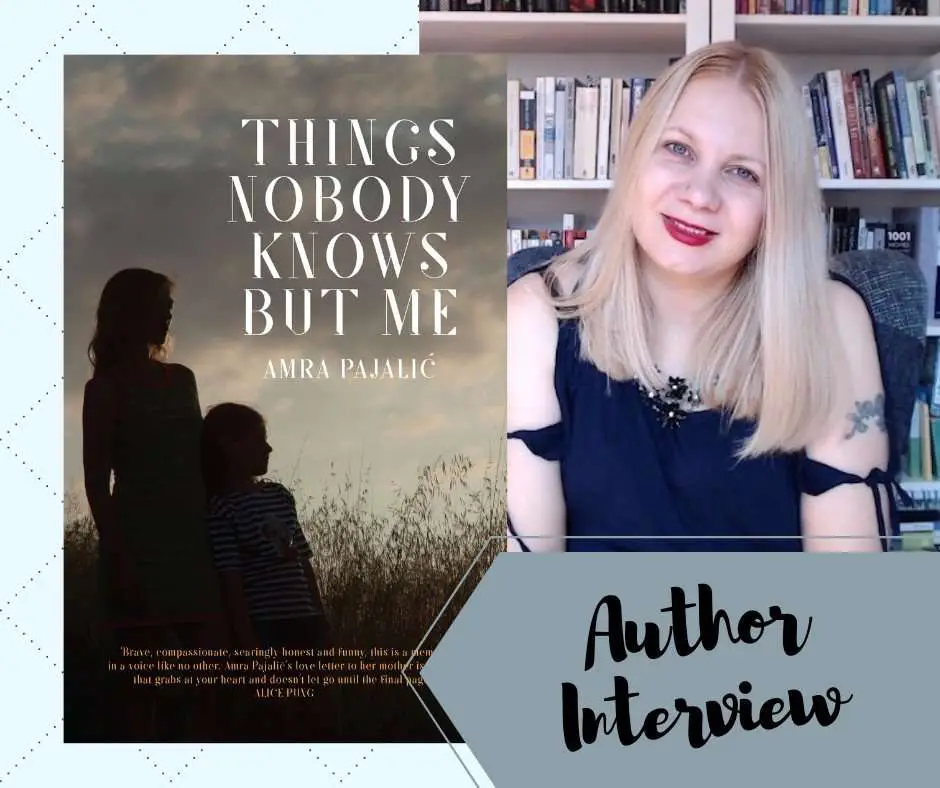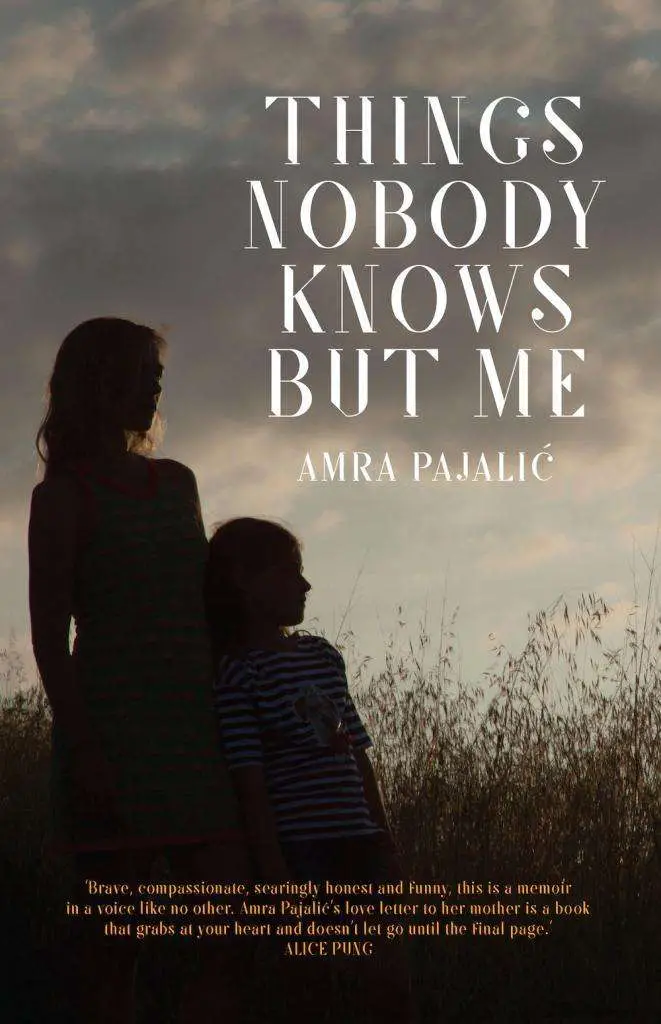Amra Pajalić on the inspiration behind memoir Things Nobody Knows But Me
Today we welcome author Amra Pajalić to share the inspiration behind her new book Things Nobody Knows But Me.

Amra Pajalić on the inspiration behind Things Nobody Knows But Me
I have been writing this book most of my life in different incarnations. I first began it when I was 20 and studying a writing course. I began a memoir in my non-fiction subject and titled it Sins of the Mother about being the daughter of a Bi Polar sufferer and about the hardship that my mother endured being from a Non-English Speaking Background while suffering from a mental illness. I was very judgemental about the decisions my mother made and the way these had impacted me. I completed enough chapters to submit for the subject, received a mediocre grade, and hid it in my (metaphorical) bottom drawer.
I turned away from non fiction—it demanded an honesty and rawness I wasn’t ready to bring.
Instead I concentrated on fiction and my debut novel was heavily inspired by my teenage experiences. When I had my daughter my childhood memories resurfaced and now that I was a mother myself I felt more compassion toward my own mum. I had every advantage possible—I was 31-years-old, my baby was from a much wanted and planned pregnancy, and I had an incredibly supportive husband that I had been married to for ten years at that point—and yet I flailed. When my baby was 10-months-old I was felled by post-natal depression.
My mother, on the other hand, had every disadvantage possible. When she was 15-years-old, my mother found herself in an arranged marriage. At 16, she was a migrant, a mother and a mental patient. Her life was extraordinary because of her ability to survive all the upheavals that she faced.
I found myself compelled to tell her story because there was a need for a story about mental illness from the perspective of those from a Non-English Speaking Background.
Mental illness carries with it stigma and shame in any cultural context, however Bosnia which was once a part of Yugoslavia, was a communist country and people with mental illness were shunned and segregated. This led to a mistrust and misunderstandings about mental illness that affected my mother’s access to treatment. For many years she called her illness nervous breakdowns and did not actually know the name of her disorder, Bi Polar, or understand the symptoms and treatment. It was only when she learnt about these things that she was able to take control of her illness and achieve a better quality of life.
While I writing Things Nobody Knows But Me I spent a year interviewing my mother and trying to recreate her perspective. She was very open and honest because she wanted this book to help others who are Bi Polar sufferers and to help readers understand this illness. I found the process of interviewing and writing about her experiences healing. All the judgement that I had carried about the ways my mother failed me as a child: the upheavals, the bad relationships, the changes in school, going into foster homes, being left to live my grandparents for two years in Bosnia—were forgiven. In writing this book I came to understand she was a victim of her brain chemistry and she did the best she could with what she had. That’s all a daughter can ask for.
~
Disclosure: If you click a link in this post we may earn a small commission to help offset our running costs.
 Things Nobody Knows But Me Synopsis:
Things Nobody Knows But Me Synopsis:
‘Brave, compassionate, searingly honest and funny, this is a memoir in a voice like no other. Amra Pajalić’s love letter to her mother is a book that grabs at your heart and doesn’t let go until the final page.’ — Alice Pung
When she is four years old Amra Pajalić realises that her mother is different. Fatima is loving but sometimes hears strange voices that tell her to do bizarre things. She is frequently sent to hospital and Amra and her brother are passed around to family friends and foster homes, and for a time live with their grandparents in Bosnia.
At sixteen Amra ends up in the school counsellor’s office for wagging school. She finally learns the name for the malady that has dogged her mother and affected her own life: bipolar disorder. Amra becomes her mother’s confidante and learns the extraordinary story of her life: when she was fifteen years old Fatima visited family friends only to find herself in an arranged marriage. At sixteen she was a migrant, a mother, and mental patient.
Surprisingly funny, Things Nobody Knows But Me is a tender portrait of family and migration, beautifully told. It captures a wonderful sense of bicultural place and life as it weaves between St Albans in suburban Australia and Bosanska Gradiška in Bosnia. Ultimately it is the heartrending story of a mother and daughter bond fractured and forged by illness and experience. Fatima emerges as a remarkable but wounded woman who learns that her daughter really loves her.
(Transit Lounge Publishing, 1 May 2019)
Get your copy of Things Nobody Knows But Me from:
Amazon | Booktopia(Aus/NZ) | Kobobooks | iBooks | Transit Lounge
About the Author, Amra Pajalić
Amra Pajalić is a Melbourne-based author of Bosnian background. Her debut novel The Good Daughter (Text Publishing, 2009) won the 2009 Melbourne Prize for Literature’s Civic Choice Award, and was a finalist in the 2009 Melbourne Prize for Literature Best Writing Award. Prior to publication it was shortlisted in the 2007 Victorian Premier’s Awards for Best Unpublished Manuscript. She is also the author of a novel for children, Amir: Friend on Loan (Garratt Publishing, 2014).
Amra is co-editor of the anthology Growing up Muslim in Australia (Allen & Unwin, 2019) that was shortlisted for the 2015 Children’s Book Council of Australia Eve Pownall Award for Information Books. She also wrote the teaching notes published by Allen & Unwin.
Amra has appeared on panels at conferences and literary festivals including at the Wheeler Centre, Melbourne Writers Festival, Williamstown Literary Festival, Reading Matters Conference Panel, and the VicTESOL Conference. She has delivered workshops and presented at various library and community organisations, and was a judge and convenor of the Premier’s Awards for an Unpublished Manuscript.
She was funded by Artists in Schools to be an Artist in Residence in 2010, 2011 and 2012 in high schools, and in 2014 received funding from Creative Victoria to be mentored by Alice Pung to work on her memoir.
She works as a high school teacher and is completing a PhD in Creative Writing at La Trobe University. Her website is www.amrapajalic.com.
